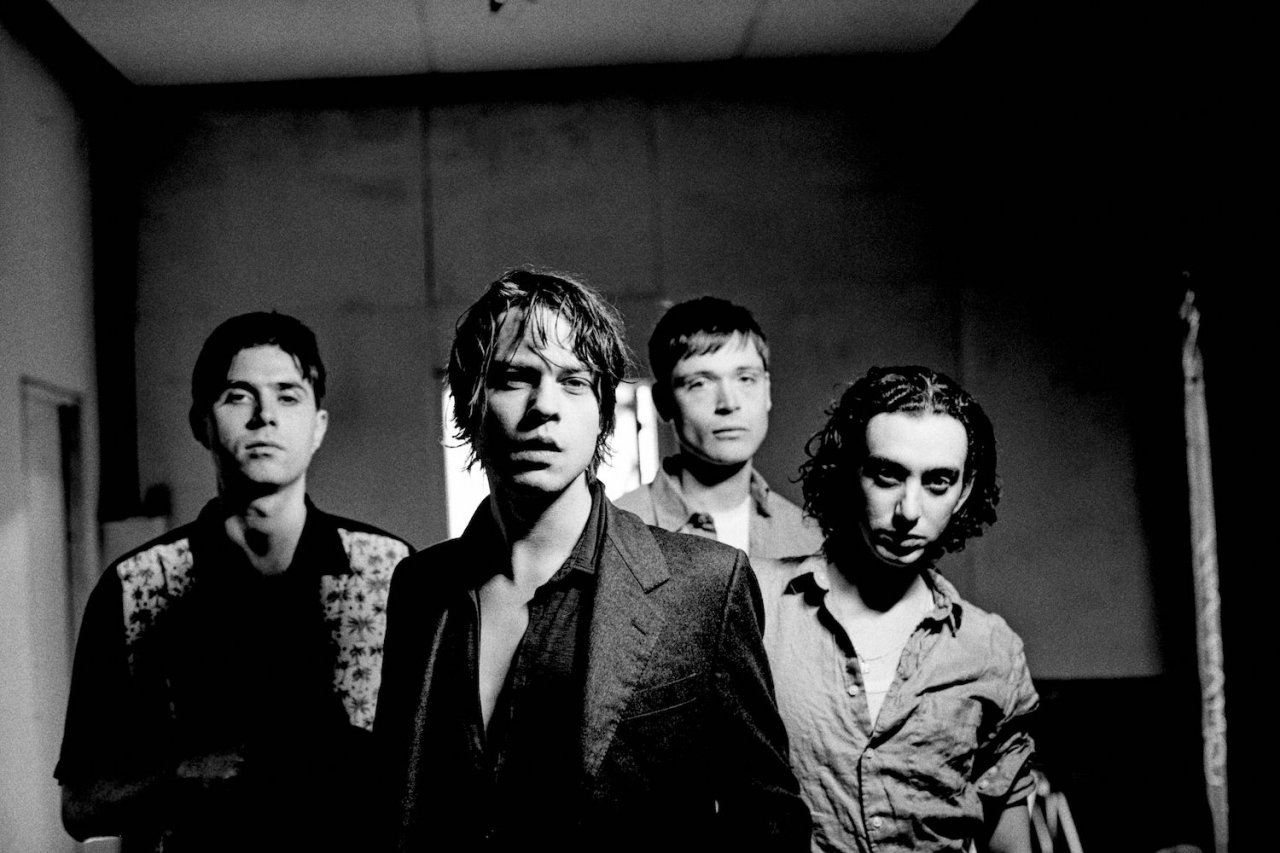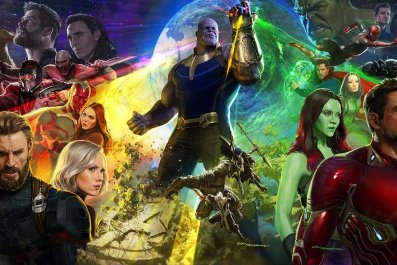Like a lot of teenagers, Elias Bender Rønnenfelt spent hours alone in his room listening to music. He was a Danish kid growing up in the new millennium, but the sounds that excited him were American and British, from prior decades. "All sorts of New York no wave bands," says the now 26-year-old Rønnenfelt. "David Bowie. Crass. Teen Idles."
One of his favorites: the seminal punk band Richard Hell and the Voidoids. So it was disorienting for Rønnenfelt when Richard Hell, the 68-year-old punk veteran, recently wrote an impassioned essay in praise of his own band, Iceage. In it, the veteran imagines himself "as a kid lying in my closed-door room in the dark, listening to this band and getting what I need." That was weird to read, Rønnenfelt tells Newsweek while visiting the New York offices of Matador Records in March: "It's strange," he adds, "when a voice from your teenage bedroom speaks back at you."
He and his bandmates—childhood friends Jakob Tvilling Pless (bass), Dan Kjær Nielsen (drums) and Johan Suurballe Wieth (guitar)—were in the city to promote their fourth album, Beyondless, which has a sound that subverts the band's early punk energy with goth-rock fury. Not that Iceage intended to be limited to a genre. "We never identified as any," Rønnenfelt says. "It's important to us never to conform or agree with anyone else's idea of what we might be. [You have to] withhold some sense of mystery."
The band members have been accustomed to critical adulation since a young age. In 2011, their debut—a taut, 24-minute blast of adolescent angst titled New Brigade—drew international acclaim, even from critics who otherwise wouldn't give a hardcore record a second glance. It was no fluke: The artful and ferocious You're Nothing followed in 2013, after the band landed a deal with Matador. The process was fast. "The first record was recorded in four days or something like that," says Iceage's longtime producer, Nis Bysted. For You're Nothing, "we had maybe five or six days. And we had about four overdubs on the entire record."
Iceage quickly amassed a reputation for brutal, The Birthday Party–esque live shows that teetered on the edge of physical peril (at one point, the band's blog collected photos of fans showing off wounds received at their concerts). Iggy Pop called the group "the only current punk band I can think of that sounds really dangerous." That danger is of a more brooding nature on Iceage's excellent latest record, Beyondless (out May 4). It's hardly hardcore. The songs are too long, the tempos woozy and slowed; there's intensity, but it simmers rather than erupts, with lush violins and horns in the mix.
The new material expands on some richer instrumental terrain introduced on the band's last album, Plowing Into the Field of Love (2014). "They've become more and more adventurous," says Bysted, "opening up to more and more experimental ideas." Indie-pop singer Sky Ferreira shows up to lend backing vocals on a seductive, inky-black love song called "Pain Killer." (Sample lyric: "Like death, she takes everything / And dazes me like patent medicine.") Still, don't expect anything less than an aural assault when they tour.
A few days after our interview, I trekked to a basement gallery in Manhattan to see Iceage perform, but by the time I arrived the fire department had already shut down the gig. The next evening, the band successfully played a packed show in a cramped, attic-like performance space attached to a bar in the Bushwick neighborhood of Brooklyn. Iceage blasted through the new album as a sweat-drenched Rønnenfelt gyrated around the small stage. There was no patter—the songs songs collided into each other, Ramones-style. A saxophonist brought a bleating, free-jazz element to the roar. The noise volume evidently caused several vinyl records taped to the balcony to fall loose and land on fans' heads
Such energy takes a toll. In 2015, the band spent four grueling months touring North America and Europe. "Many times we've been on the brink of insanity," says Rønnenfelt, back at the Matador office, where loud construction noises from outside sounded like they were auditioning to join Iceage. For Beyondless, Iceage will tour America for just two months, beginning in May, and he has mixed feelings about it. "Sometimes you go to a tiny city you've never heard about, and it has the best crowds [because] kids are bored and have nothing to do," says Rønnenfelt. "Sometimes it's dead as hell. And generic and depressing. You never know with these small towns."
Over the years, Rønnenfelt has developed a reputation as a prickly, guarded rocker—a Fader profile once dubbed him "Rock's Most Difficult Frontman"—and as a gifted writer with a knack for tangled, disturbing imagery. "He has these periods when he secludes himself to writing and we don't see much of him," says Bysted. "The lyrics part is something that no one really messes with. He's so brilliant at it—it's his turf."
Bysted has known the singer since he was a precocious 13-year-old, soaking up old records like a post-punk sponge. "He was a really weird kid," Bysted says. "Early on, he just knew so much music. He could talk to a 50-year-old guy about music from the late '70s or something weird from the beginning of the '90s."
Rønnenfelt's lyrics elude simplistic interpretation, and Beyondless benefits from the singer's dark imagination. On "Hurrah," he seems to adopt the perspective of a bloodthirsty soldier: "Cuz we can't stop killing / And we'll never stop killing / And we shouldn't stop killing," goes the pummeling chorus. "It's about warfare and the cruelty of man and the deep-rooted instinct to kill your neighbor," says Rønnenfelt, who is disturbed by the rise of far-right nationalism in Europe and America. "It's important to acknowledge how dangerous we are, and how that potential lies in most of us."
Rønnenfelt never finished high school (Iceage formed when the band members were 16 and 17), but he reads incessantly. The group's songs have been inspired by, among other books, Story of the Eye by Georges Bataille—which prompted the singer's own interest in writing—and Jean Genet's The Thief's Journal, both notable for their shocking and frank depictions of sexual exploits. He found the word beyondless in Worstward Ho, a book by Samuel Beckett. "He plays a lot with breaking apart language and constructing incorrect sentences that give new meanings," says Rønnenfelt. "Beyondless is just a word that I discovered doesn't exist. It still suggests a perfect meaning to me—that beyond followed by less couldn't [exist]."
The paradoxical term also evokes the band's knack for nodding to punk and post-punk achievements of the past while crafting something urgent and new. Richard Hell would be proud—or rather, he is.















